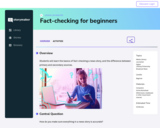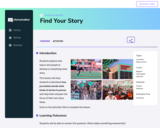Grades 3-5The lesson focuses on the importance of music in media.
- Subject:
- Media and Communications
- Material Type:
- Lesson
- Author:
- Utah Lesson Plans
- Date Added:
- 10/29/2021
Grades 3-5The lesson focuses on the importance of music in media.

This lesson asks students to analyze a historical claim made on Twitter about the Equal Rights Amendment and to use the internet to investigate whether the claim is reliable. To begin, use the Equal Rights Amendment PowerPoint to introduce the tweet and provide students with historical context for the ERA. Note: A free educator account is required to access these materials.
Students will compare two websites (one obviously more credible than the other) and evaluate them using the "CRAP checklist." They will look at factors like currency, reliability, accuracy, and purpose.

The Big6 is a six-stage model to help anyone solve problems or make decisions by using information. Students can use this model to guide them through the research process. This resource helps students evaluate their research skills using the Big6 model.

This lesson introduces students to evaluating evidence on social media and provides students with an opportunity to practice evaluating evidence on Twitter and Facebook. Note: A free educator account is required to access these materials.
The teacher will show the Dog Island website and ask the students to help evaluate whether Dog Island is a good place to send his/her dog. Students will evaluate domain, author, date, appearance and reasonability to determine if Dog Island is a credible website and if Dog Island is a real place.

Wikipedia contains a vast supply of information and is the 5th most trafficked website in the world. Still, students often draw overly broad generalizations about the site. This task asks students to evaluate the trustworthiness of an article on Wikipedia, assessing whether they can reason about the specific features that make a Wikipedia article more or less reliable. Note: A free educator account is required to access these materials.

The Big6 is a six-stage model to help anyone solve problems or make decisions by using information. Students can use this model to guide them through the research process. This resource describes a Big6 lesson focused on the final step of the Big6 model, evaluation.

Students will learn the basics of fact-checking a news story, and the difference between primary and secondary sources.

The Big6 is a six-stage model to help anyone solve problems or make decisions by using information. Students can use this model to guide them through the research process. This resource guides students through writing a fiction book report.
1st/2nd grade: Students will use a visual, physically involved activity to understand and categorize fiction/narrative and non-fiction/informational books.

© Utah Film Center, 2022. Want to start making high quality media content but don't know where to get started? Join Utah Film Center's Media Education Department as they guide you through equipment and tips for any budget.
For more information or to bring Utah Film Center to your K-12 classroom, please visit www.utahfilmcenter.org/educatio

Get ready to be inspired by Utah's creative and diverse student filmmakers in this episode of Students in Focus! In this filmmaker spotlight, we hear from a music video director who started in action sports, he shares his story about how his film career grew into what he's most passionate about today.

In this filmmaker spotlight, we have Jerusha Hess, the writer/director known for Austenland (2013), the cult classic Napoleon Dynamite (2004) and most recently, the Academy Award-nominated short film Ninety-Five Senses (2023).

Filmmaking has its own mix of styles, but what brings it all together is each filmmaker's passion for sharing their own perspective. In this filmmaker spotlight, Katie interviews Josh Gunn, the creative director at Planet Nutshell.

In this filmmaker spotlight, we hear from a University of Utah film graduate, Katie Beacom, currently working as an Associate Producer, who shares her journey from student to professional.

In this filmmaker spotlight, student host Katie Neal sits down with Liz Adeola, producer and host at PBS Utah, to discuss her career path and passion for storytelling.

In this filmmaker spotlight, we hear expert insights from filmmaker Nic Edwards, a skilled 1st Assistant Camera and camera operator.

Students explore new topics and people to develop a compelling news story.
This lesson will help students understand how journalists decide what kinds of stories to pursue and help them sharpen the focus of their own story ideas.
Students are given a list of materials that exist in the library. They have a time limit to find the materials. Answer a question about each item on the list and return the paper to the teacher.